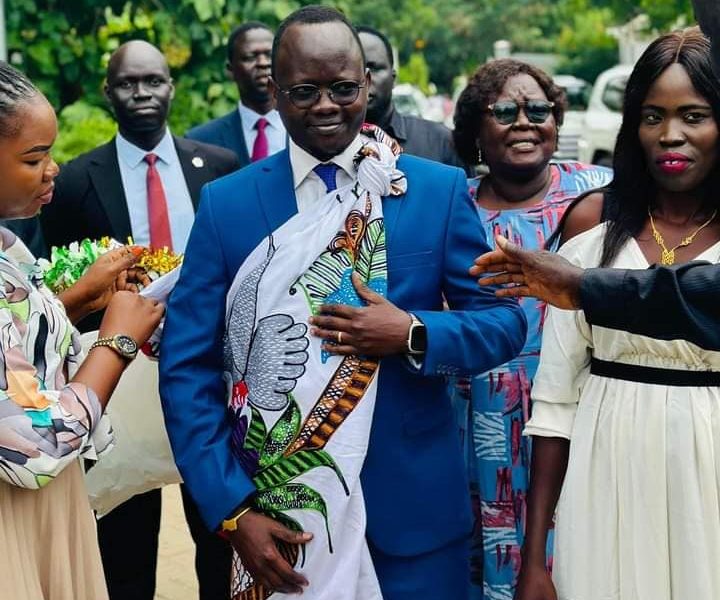By William Madouk
The newly appointed minister of Finance and Economic Planning faces hard task of dealing with a skyrocketing commodity prices and declining national economy.
Dr. Bak Barnaba Chol Bak, whose appointment has come at a stormy moment of financial agony, is seen by citizens as a master brain that can give life to the ailing economy of the country.
Currently, citizens are strained with high food prices as South Sudanese Pound (SSP) hits a new record low against the US dollar, bringing the exchange rate dangerously close to over SSP 1,000 per dollar.
On Thursday, President Salva Kiir took the decision to remove the former Minister of Finance, Dier Tong Ngor, replacing him with Dr. Bak Barnaba Chol to drive the ministry.
In a presidential decree read over a state-owned SSBC radio and TV, the president did not disclose the reason behind the reshuffle in the Finance ministry.
But it coincides with South Sudan’s ongoing challenges, such as a dwindling economy and multiple external chocks making the country weak and opts for a dollar auctioning spree to tame a volatile market that yielded no fruit.
During the swearing-in ceremony on Friday, President Salva Kiir tasked the incoming finance minister to urgently addressing the runaway inflation in the country.
The Head of State told the new minister to stay focused on the job and “not to accept being intimidated by those people who want to run away with public money,” reads a part of the statement from the president.
He also assured the new minister of his absolute cooperation while tackling the economic reform agenda.
Meanwhile, the incoming minister promised to work and rein the hyperinflation while paying salaries and wages on time.
He noted that the South Sudanese Pound was undervalued and promised a strong response to the country’s economic crisis.
In an exclusive interview with No. 1 citizen Daily Newspaper, the advisor for the economic cluster in the interim unity government, Dr. Abraham Maliet expressed caution in judgment.
“It is too early to judge or praise the new minister but advised Dr. Bak to solicit like-minded people if he is to succeed,” he said.
Dr. Maliet observes that only appropriate approaches by the incoming minister, to the current economic situation of the country would yield positive results.
“If he comes with a different approach to tackle this [economy] and works with like-minded people in the profession, within six months things can improve,” Maliet said.
The economist stated that former ministers of finance, Mr. Dier and his predecessors, failed simply because they operated ‘alone’ and sidelined economists who could be great help in preparing economic and planning policies.
“No one has ever come with an agenda that gets out of hand; if he comes to work ‘solo’ like others, he will fail—that is for sure. Because what made others fail was because they took it on as their own personal job,” he warned.
Dr. Maliet cautioned the new minister against bias and appointing acquaintances during employment but rather to recruit people on merit, competency, and qualification, even if their opinions differ.
“I just want to congratulate Dr. Barnaba and say, Look! Welcome aboard! At this particular time, our country is facing challenges. Please just review whatever is not done right by others and then come out with a collective approach,” he stressed.
But James Boboya, a policy and political analyst at the Institute of Social Policy and Research, is pessimistic of frequent changes in finance ministry.
“In my view, even if he [the president] changes several ministers in the ministry of finance and economic planning, it will not improve the situation that is currently being felt in the economic situation in South Sudan,” Boboya said.
According to Boboya nothing would change unless there was robust reform in the finance docket.
“Improving the economy requires robust reform that needs to happen in line with the revitalized peace agreement and also within the framework of the roadmap that is currently being implemented,” he added.
The Political analyst stated that if the country could not see reforms within the ministry of finance and the Bank of South Sudan, then the bedeviling economic crisis would continue to manifest itself.
Boboya argues that though the political appointees might have papers, the system has been designed not to use their skills and qualifications but to get money into an individual’s pockets.
He also noted the recent alarming trend in which ex-ministers of finance are fired at a time when the budget is still being debated in parliament, giving no chance for the minister to participate in the defense of the budget process and posing job insecurity for newly appointed ministers.
“People don’t know their future, so the best option is whatever comes that they keep eating, and whatever they eat is supposed to go for service delivery, salaries for running government offices, etc.”
It’s worth noting that the former minister recently presented a budget proposal totaling 2.1 trillion SSP for the upcoming 2023-2024 fiscal year.
Dier Tong Ngor had assumed the role of Finance Minister precisely one year ago, prior to his recent replacement.
The new minister of finance, Dr. Barnaba Bak holds a Bachelor of Science in economics from the University of Juba and a master’s in business administration (MBA) in International Finance from the University of Buckingham.
He also attained a Doctorate in Business Administration from the US International University in Kenya, as well as numerous certificates from top-tier universities like Columbia and the Investment Banking Institute in New York.
Mr. Bak, who is also the founder of St. Barnaba Business College in Juba, is an assistant professor at the University of Juba. He is the author of many academic papers published both globally and locally.




